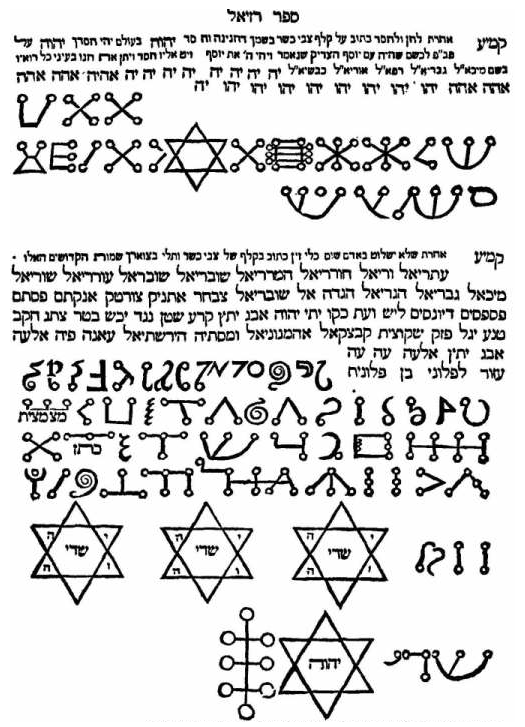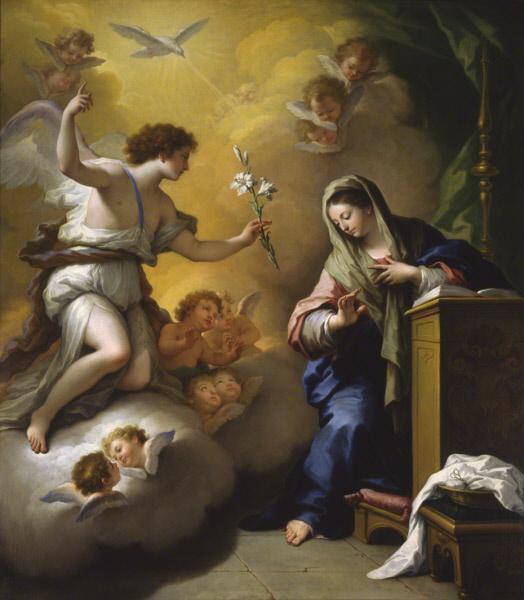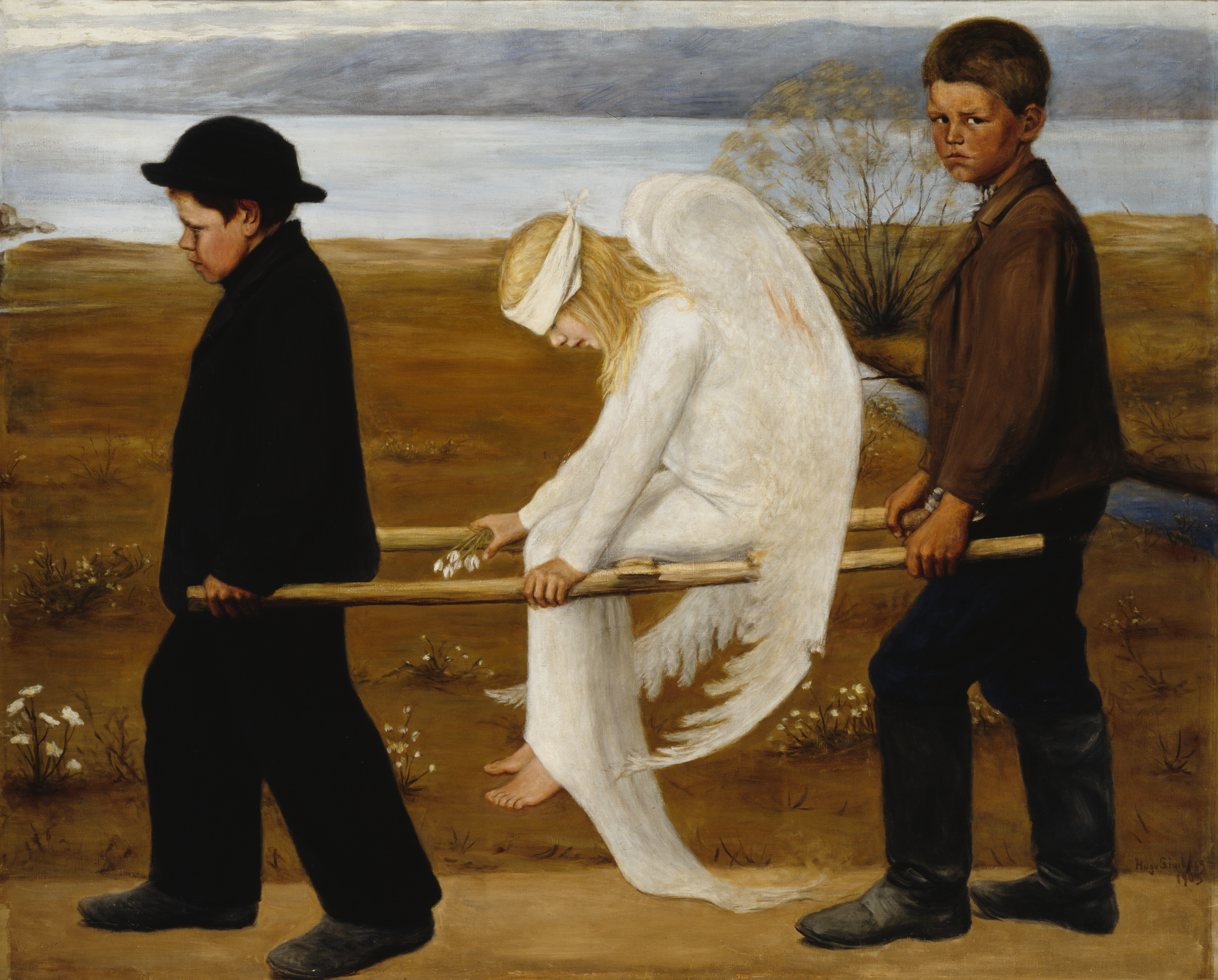|
Raziel
Raziel, ( ''Rāzīʾēl,'' "God is my Mystery") also known as Gallitsur ( Hebrew: גַּלִּיצוּר ''Gallīṣūr'') is an angel within the teachings of Jewish mysticism (of the Kabbalah of Judaism) who is the "Angel of Secrets" and the "Angel of Mysteries”. He is also called "Keeper of All Magic." He is one of the angels associated with the sephirah Chokhmah of Kabbalah, alongside Jophiel.Lewis, James R., Oliver, Evelyn Dorothy, Sisung Kelle S. (Editor) (1996), ''Angels A to Z'', Entry: Raziel, pp. 346, 347, Visible Ink Press, Mysticism and tradition Various teachings assign Raziel to diverse roles, including that of a cherub, a member of the Ophanim, and chief of the Erelim. Raziel, under the alternate name Gallitsur "Revealer of The Rock" is described as the "ruling prince of the 2nd Heaven". He is said to expound the "Torah's divine wisdom" and protects the ministering angels from the living creatures that uphold the universe.Davidson, Gustav (1967), A Dictionary of ... [...More Info...] [...Related Items...] OR: [Wikipedia] [Google] [Baidu] |
Sefer Raziel HaMalakh
''Sefer Raziel HaMalakh'', (Hebrew:, "the book of Raziel the angel''"''), is a grimoire of Practical Kabbalah from the Middle Ages written primarily in Hebrew and Aramaic. ''Liber Razielis Archangeli'', its 13th-century Latin translation produced under Alfonso X of Castile, survives. Textual history The book cannot be shown to predate the 13th century, but may in parts date back to late antiquity. Like other obscure ancient texts such as the ''Bahir'' and ''Sefer Yetzirah'', the work has been extant in a number of versions. The tradition around the book attributes it to have been revealed to Adam by the angel Raziel. The title itself is mentioned in another magical work of late antiquity, ''The Sword of Moses''. Critical historians regard it as a medieval work, most probably originating among the Ashkenazi Hasidim, as citations from it begin to appear only in the 13th century. Sections of it are no doubt older. The likely compiler of the medieval version is Eleazar of Worms, as ... [...More Info...] [...Related Items...] OR: [Wikipedia] [Google] [Baidu] |
Kabbalah
Kabbalah ( he, קַבָּלָה ''Qabbālā'', literally "reception, tradition") is an esoteric method, discipline and Jewish theology, school of thought in Jewish mysticism. A traditional Kabbalist is called a Mekubbal ( ''Məqūbbāl'' "receiver"). The definition of Kabbalah varies according to the tradition and aims of those following it, from its origin in medieval Judaism to its later adaptations in Western esotericism (Christian Kabbalah and Hermetic Qabalah). Jewish Kabbalah is a set of esoteric teachings meant to explain the relationship between the unchanging, eternal God in Judaism, God—the mysterious ''Ein Sof'' (, ''"The Infinite"'')—and the mortal, finite universe (God's Genesis creation narrative, creation). It forms the foundation of Mysticism, mystical religious interpretations within Judaism. List of Jewish Kabbalists, Jewish Kabbalists originally developed their own transmission of Primary texts of Kabbalah, sacred texts within the realm of Jewish traditio ... [...More Info...] [...Related Items...] OR: [Wikipedia] [Google] [Baidu] |
Jewish Mysticism
Academic study of Jewish mysticism, especially since Gershom Scholem's ''Major Trends in Jewish Mysticism'' (1941), distinguishes between different forms of mysticism across different eras of Jewish history. Of these, Kabbalah, which emerged in 12th-century Europe, is the most well known, but not the only typologic form, or the earliest to emerge. Among previous forms were Merkabah mysticism (c. 100 BCE – 1000 CE), and Ashkenazi Hasidim (early 13th century) around the time of Kabbalistic emergence. Kabbalah means "received tradition", a term previously used in other Judaic contexts, but which the Medieval Kabbalists adopted for their own doctrine to express the belief that they were not innovating, but merely revealing the ancient hidden esoteric tradition of the Torah. This issue is crystallised until today by alternative views on the origin of the Zohar, the main text of Kabbalah which was written by Rabbi Shimon Bar Yochai who opened up the study of Jewish Mysticism. T ... [...More Info...] [...Related Items...] OR: [Wikipedia] [Google] [Baidu] |
Archangel Raziel (Circle Of Francisco De Zurbarán)
Archangels () are the second lowest rank of angel in the hierarchy of angels. The word ''archangel'' itself is usually associated with the Abrahamic religions, but beings that are very similar to archangels are found in a number of other religious traditions. Archangels also appear in the religious texts of Gnosticism. The English word ''archangel'' is derived from Ancient Greek, Greek ἀρχάγγελος (arkhángelos), the Greek prefix "wikt:arch-, arch-" meaning "chief". A common misconception is that archangels are the highest rank of angel, this misconception stems from John Milton's ''Paradise Lost'' and likely confusion over the "arch-" prefix. Description Michael (archangel), Michael and Gabriel are recognized as archangels in Judaism, Islam, and by most Christians. Some Protestants consider Michael to be the only archangel. Raphael (archangel), Raphael—mentioned in the deuterocanonical books, deuterocanonical Book of Tobit—is also recognized as a chief angel i ... [...More Info...] [...Related Items...] OR: [Wikipedia] [Google] [Baidu] |
Jophiel
The angel Jophiel ( Heb. ''Yōp̄īʾēl'', "God is my beauty"), also called ''Iophiel'', ''Iofiel'', ''Jofiel'', ''Yofiel'', ''Youfiel'', Zophiel ( ''Ṣōp̄īʾēl'', "God is my watchman") and Zuriel ( ''Ṣūrīʾēl'', "God is my rock"), is a non-canonical archangel of wisdom, understanding, and judgment, art and beauty. She is listed as one of the Seven Archangels in Pseudo-Dionysian teachings. Due to the association with beauty, Jophiel is one of very few angels to be sometimes portrayed as female. However, many angels have no canonical gender, and are most commonly referred to by male pronouns. Beliefs in religions and ceremonial magic According to the pseudepigraphal Revelation of Moses, another name for Jophiel is Dina ( Hebrew: דִּינָה ''Dīnā'', "Judgement"). In the text, Jophiel/Dina is described as an angel of the seventh heaven, a Cabalistic guardian of the Torah (and wisdom itself), who taught 70 languages to souls at the dawn of creation. The Zohar ... [...More Info...] [...Related Items...] OR: [Wikipedia] [Google] [Baidu] |
Magic (paranormal)
Magic, sometimes spelled magick, is an ancient praxis rooted in sacred rituals, spiritual divinations, and/or cultural lineage—with an intention to invoke, manipulate, or otherwise manifest supernatural forces, beings, or entities in the natural, incarnate world. It is a categorical yet often ambiguous term which has been used to refer to a wide variety of beliefs and practices, frequently considered separate from both religion and science. Although connotations have varied from positive to negative at times throughout history, magic continues to have an important religious and medicinal role in many cultures today. Within Western culture, magic has been linked to ideas of the Other, foreignness, and primitivism; indicating that it is "a powerful marker of cultural difference" and likewise, a non-modern phenomenon. During the late nineteenth and early twentieth century, Western intellectuals perceived the practice of magic to be a sign of a primitive mentality and also commo ... [...More Info...] [...Related Items...] OR: [Wikipedia] [Google] [Baidu] |
Angel
In various theistic religious traditions an angel is a supernatural spiritual being who serves God. Abrahamic religions often depict angels as benevolent celestial intermediaries between God (or Heaven) and humanity. Other roles include protectors and guides for humans, and servants of God. Abrahamic religions describe angelic hierarchies, which vary by religion and sect. Some angels have specific names (such as Gabriel or Michael) or titles (such as seraph or archangel). Those expelled from Heaven are called fallen angels, distinct from the heavenly host. Angels in art are usually shaped like humans of extraordinary beauty. They are often identified in Christian artwork with bird wings, halos, and divine light. Etymology The word ''angel'' arrives in modern English from Old English ''engel'' (with a hard ''g'') and the Old French ''angele''. Both of these derive from Late Latin ''angelus'', which in turn was borrowed from Late Greek ''angelos'' (literally "messenge ... [...More Info...] [...Related Items...] OR: [Wikipedia] [Google] [Baidu] |
Angel
In various theistic religious traditions an angel is a supernatural spiritual being who serves God. Abrahamic religions often depict angels as benevolent celestial intermediaries between God (or Heaven) and humanity. Other roles include protectors and guides for humans, and servants of God. Abrahamic religions describe angelic hierarchies, which vary by religion and sect. Some angels have specific names (such as Gabriel or Michael) or titles (such as seraph or archangel). Those expelled from Heaven are called fallen angels, distinct from the heavenly host. Angels in art are usually shaped like humans of extraordinary beauty. They are often identified in Christian artwork with bird wings, halos, and divine light. Etymology The word ''angel'' arrives in modern English from Old English ''engel'' (with a hard ''g'') and the Old French ''angele''. Both of these derive from Late Latin ''angelus'', which in turn was borrowed from Late Greek ''angelos'' (literally "messenge ... [...More Info...] [...Related Items...] OR: [Wikipedia] [Google] [Baidu] |
Chokhmah
''Chokmah'' ( Hebrew: חָכְמָה ) is the Biblical Hebrew word rendered as "wisdom" in English Bible versions (LXX '' sophia'', Vulgate ').''Strong's Concordance'H2451 "from H2449 �ָכַם ''chakam'' "wise" wisdom (in a good sense):—skilful, wisdom, wisely, wit." "The KJV translates Strong's H2451 in the following manner: wisdom (145x), wisely (2x), skilful man (1x), wits (1x)." The word occurs 149 times in the Masoretic Text of the Hebrew Bible It is cognate with the Arabic word for "wisdom", ''ḥikma'' (Semitic root ). Adjectival "wise" is used as a honorific, as in ''Talmid Chacham'' (lit. "student of a sage") for a Torah scholar, or ''hakham Bashi'' for a chief rabbi. The Talmud (Shabbat 31a) describes knowledge of the Talmudic order of Kodshim as a high level of wisdom, ''chokhmah''. In the Kabbalah, ''Chokhmah'' is the uppermost of the sephirot of the right line (''kav yamin'', the "Pillar of Mercy") in the Tree of Life. It is to the bottom right of Keter, w ... [...More Info...] [...Related Items...] OR: [Wikipedia] [Google] [Baidu] |
3 Enoch
The Third Book of Enoch ( he, ספר חנוך לר׳ ישמעאל כ׳׳ג , abbreviated as 3 Enoch) is a Biblical apocryphal book in Hebrew. 3 Enoch purports to have been written in the 2nd century, but its origins can only be traced to the 5th century. Other names for 3 Enoch include The Book of the Palaces, The Book of Rabbi Ishmael the High Priest and The Revelation of Metatron. Most commonly, the Book of Enoch refers to 1 Enoch, which survived completely only in Ge'ez. There is also a Second Book of Enoch, which has survived only in Old Slavonic, although Coptic fragments were also identified in 2009. None of the three books are considered canonical scripture by the majority of Jewish or Christian bodies. Content Modern scholars describe this book as pseudepigraphal, as it says it is written by "Rabbi Ishmael" who became a "high priest" after visions of ascension to Heaven. This has been taken as referring to Rabbi Ishmael, a 3rd generation Tanna and a leading figure of M ... [...More Info...] [...Related Items...] OR: [Wikipedia] [Google] [Baidu] |
The Shadowhunter Chronicles
''The Shadowhunter Chronicles'' is a media franchise based on the writings of American young adult fiction writer Cassandra Clare, which currently encompasses six series of novels, three short-story collections, five graphic novels, one film, a television series, and other media. These works are set in a universe where fairy tales and mythologies, both pagan and Judeo-Christian, exist with its figures existing alongside the mundanes (normal humans). A race of humans who possess angel blood, the Nephilim or Shadowhunters, is organized to patrol the Shadow World and prevent demons as well as Downworlders, including warlocks, faeries, werewolves, and vampires, from attacking the mundanes. There is an uneasy peace, a treaty known as The Accords, between the governing body of the Nephilim, known as the Clave, and the Downworlders, not all of whom want peace or respect the Clave's authority. Novels The following books are arranged in order of their respective timelines. ''The Infernal ... [...More Info...] [...Related Items...] OR: [Wikipedia] [Google] [Baidu] |
Cassandra Clare
Judith Lewis (née Rumelt; born July 27, 1973), better known by her pen name Cassandra Clare, is an American author of young adult fiction, best known for her bestselling series The Mortal Instruments (series), ''The Mortal Instruments''.'' Personal life Clare was born Judith Rumelt to American parents in Tehran, Iran. She is the daughter of Richard Rumelt, a business school professor and author. Her maternal grandfather was film producer Max Rosenberg. Clare is Jewish and has described her family as "not religious". As a child, Clare traveled frequently, spending time in Switzerland, England, and France. She returned to Los Angeles for high school, and from then on split her time between California and New York City, where she worked at various entertainment magazines and tabloids, including ''The Hollywood Reporter''. While living in Los Angeles, Clare began writing fan fiction using the name Cassandra Claire. ''The Draco Trilogy'', based on ''Harry Potter'', and ''The Very S ... [...More Info...] [...Related Items...] OR: [Wikipedia] [Google] [Baidu] |
.jpg)


.jpg)




.jpg)